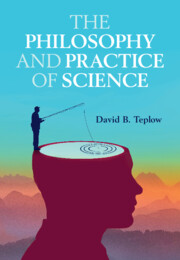Book contents
- Frontmatter
- Dedication
- Dedication
- Contents
- Foreword
- Foreword
- Preface
- Acknowledgments
- 1 Introduction
- 2 Defining Science
- 3 Learning Science
- 4 Development of the Scientific Method: From Papyrus to Petaflops
- 5 Science in Practice
- 6 Science as a Social Endeavor
- 7 Epilogue
- Appendix A: A Simple Question with Profound Implications
- Appendix B: Chaos in the Brickyard
- References
- Index
5 - Science in Practice
Published online by Cambridge University Press: 17 September 2023
- Frontmatter
- Dedication
- Dedication
- Contents
- Foreword
- Foreword
- Preface
- Acknowledgments
- 1 Introduction
- 2 Defining Science
- 3 Learning Science
- 4 Development of the Scientific Method: From Papyrus to Petaflops
- 5 Science in Practice
- 6 Science as a Social Endeavor
- 7 Epilogue
- Appendix A: A Simple Question with Profound Implications
- Appendix B: Chaos in the Brickyard
- References
- Index
Summary
This chapter details the practical, theoretical, and philosophical aspects of experimental science. It discusses how one chooses a project, performs experiments, interprets the resulting data, makes inferences, and develops and tests theories. It then asks the question, "are our theories accurate representations of the natural world, that is, do they reflect reality?" Surprisingly, this is not an easy question to answer. Scientists assume so, but are they warranted in this assumption? Realists say "yes," but anti-realists argue that realism is simply a mental representation of the world as we perceive it, that is, metaphysical in nature. Regardless of one's sense of reality, the fact remains that science has been and continues to be of tremendous practical value. It would have to be a miracle if our knowledge and manipulation of the nature were not real. Even if they were, how do we know they are true in an absolute sense, not just relative to our own experience? This is a thorny philosophical question, the answer to which depends on the context in which it is asked. The take-home message for the practicing scientist is "never assume your results are true."
Keywords
Information
- Type
- Chapter
- Information
- The Philosophy and Practice of Science , pp. 138 - 301Publisher: Cambridge University PressPrint publication year: 2023
